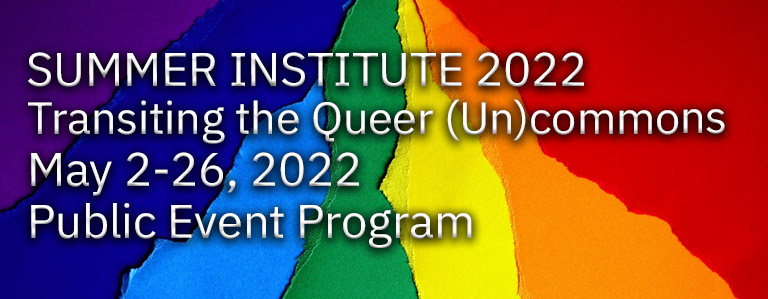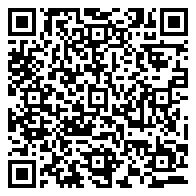
Queer and Transgender Identity in a Digital Age with Mark Gevisser and Michael Bashaija
Public Events Program
Inspired by radical new poetic methods of digital and intermedial storytelling, transgressive visual techniques emerging from new media platforms, and new activisms engaging with theories of homonationalism, pinkwashing and a global queer (un)commons, the QSI offers students immersion in the debates, voices, ideas and images of the current queer/trans digital moment. The Institute features two, interconnected graduate courses: THST 6350: Performing the Queer (Un)commons, taught by Mary Bunch and FILM 5020: Global Queer Cinemas Confront the Pink Line, taught by John Greyson.
Co-presented by the Queer Summer Institute in Research Creation and Sensorium: Centre for Digital Arts & Technology. Thank you to our partners and sponsors: SSHRC, The Hemispheric Encounters Partnership Grant, VISTA, Peripheral Visions Co-Lab, AMPD’s Office of the Associate Dean of Research, TIFF, Pleasuredome, the ArQuives, Buddies in Bad Times Theatre, and Experience York. Banner photo by Katie Rainbow on unsplash.com
Members of the public are invited to join the group for several open events.
Queer and Transgender Identity in a Digital Age:
Mark Gevisser and Michael Bashaija
MONDAY, MAY 9, 2022
2:30 – 4:00PM
ZOOM
FREE
In this event, journalist Mark Gevisser, author of The Pink Line, converses with LGBTQI+ rights activist, inspirational speaker and writer Michael Bashaija. To research The Pink Line, Mark travelled to over twenty countries, with the help of an Open Society Fellowship. His journalism on the new global discussion about sexual orientation and gender identity has appeared in The Guardian, Granta, and The New York Times. Mark’s other books include the prize-winning A Legacy of Liberation: Thabo Mbeki and the Future of the South African Dream, and Lost and Found in Johannesburg: A Memoir.
 Mark Gevisser is one of South Africa’s foremost writers. Among his current gigs is a review-essay column, The Monthly Review, in the South African Business Day. He is currently researching and writing about the COVID 19 pandemic, and the climate crisis, and continues to write about The Pink Line globally, and about South African politics, culture and society. Born in Johannesburg in 1964, Mark graduated from Yale in 1987 with a degree magna cum laude in comparative literature. He worked in New York, as a high school teacher and writing for Village Voice and The Nation, before returning to South Africa in 1990 to work as a journalist, mainly for the celebrated anti-apartheid newspaper, the Mail & Guardian. Mark’s book, Thabo Mbeki: The Dream Deferred (also known as A Legacy of Liberation) won the 2008 Alan Paton Prize in South Africa. Both this and his next book, Lost and Found in Johannesburg, won the Recht Malan Prize in South Africa and were shortlisted for the Jan Michalski Prize for World Literature. Mark’s other books are the pathbreaking Defiant Desire, Gay and Lesbian Lives In South Africa (1994), which he co-edited with Edwin Cameron, and Portraits of Power: Profiles in a Changing South Africa, a 1998 collection of his celebrated political profiles from the Mail & Guardian. He has also published widely, in anthologies, on sexual politics, culture, art, literature and urbanism in South Africa.
Mark Gevisser is one of South Africa’s foremost writers. Among his current gigs is a review-essay column, The Monthly Review, in the South African Business Day. He is currently researching and writing about the COVID 19 pandemic, and the climate crisis, and continues to write about The Pink Line globally, and about South African politics, culture and society. Born in Johannesburg in 1964, Mark graduated from Yale in 1987 with a degree magna cum laude in comparative literature. He worked in New York, as a high school teacher and writing for Village Voice and The Nation, before returning to South Africa in 1990 to work as a journalist, mainly for the celebrated anti-apartheid newspaper, the Mail & Guardian. Mark’s book, Thabo Mbeki: The Dream Deferred (also known as A Legacy of Liberation) won the 2008 Alan Paton Prize in South Africa. Both this and his next book, Lost and Found in Johannesburg, won the Recht Malan Prize in South Africa and were shortlisted for the Jan Michalski Prize for World Literature. Mark’s other books are the pathbreaking Defiant Desire, Gay and Lesbian Lives In South Africa (1994), which he co-edited with Edwin Cameron, and Portraits of Power: Profiles in a Changing South Africa, a 1998 collection of his celebrated political profiles from the Mail & Guardian. He has also published widely, in anthologies, on sexual politics, culture, art, literature and urbanism in South Africa.
Mark was a 2018 Rockefeller Foundation Bellagio Resident. He has also been a Writing Fellow at the University of Pretoria and at the Wits Institute for Social and Economic Research (WISER), and a Carnegie Equity Fellow at Wits University. Since 2018, he has been a judge on the Gerald Kraak Award for writing on gender, human rights and sexuality in Africa. Mark’s feature-length documentary, The Man Who Drove With Mandela, made with Greta Schiller, has been broadcast internationally, and won the Teddy Documentary Prize at the Berlin Film Festival in 1999. The film is an excavation of the life of Cecil Williams, the South African gay communist theatre director. Mark has also written scripts for the South African drama series Zero Tolerance; his scripts were short-listed for SAFTA and Emmy awards. Mark has also worked as an exhibition curator: he co-led the team that developed the heritage, education and tourism components of Constitution Hill, and co-curated the Hill’s permanent exhibitions. Other exhibition projects have included Joburg Tracks, an exploration of sexual identity in Johannesburg. Mark lives outside Cape Town, South Africa, with his longterm partner and their two dogs, Porridge and Sugar.
Michael Bashaija is a LGBTQI+ rights activist, inspirational speaker and writer.

